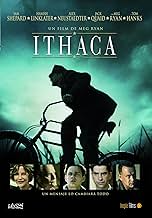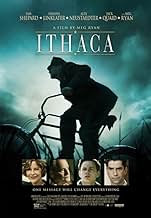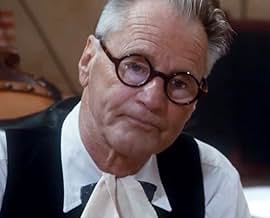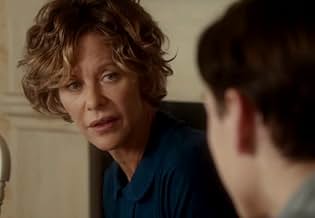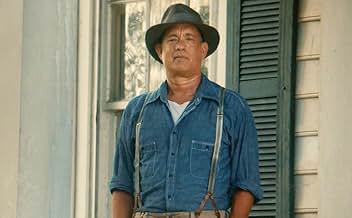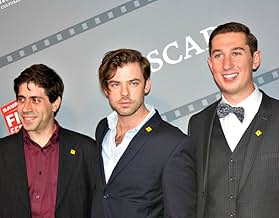IMDb RATING
5.5/10
3.3K
YOUR RATING
With his older brother off to war, fourteen-year-old telegram messenger Homer Macauley comes of age in the summer of 1942.With his older brother off to war, fourteen-year-old telegram messenger Homer Macauley comes of age in the summer of 1942.With his older brother off to war, fourteen-year-old telegram messenger Homer Macauley comes of age in the summer of 1942.
- Awards
- 2 nominations total
- Director
- Writers
- All cast & crew
- Production, box office & more at IMDbPro
Featured reviews
Greetings again from the darkness. The source material is the 1943 novel "The Human Comedy" from Pulitzer Prize winning writer William Saroyan; and it's the directorial debut of Meg Ryan, the one-time 'America's Sweetheart' who reunites with her Sleepless in Seattle co-star Tom Hanks (in a ghostly cameo). Due to these juicy ingredients, we can be excused if our expectations are a bit high.
As a viewer, it's easy to relate to the emotions of young Homer McCauley (Alex Neustaedter) as his messenger job expedites the disillusionment that often accompanies adulthood. While Homer becomes more disenchanted the more he learns, we feel let down with each successive sequence. The adapted screenplay from Eric Jendresen never picks a direction, and instead teases us with numerous pieces from the novel with little follow through on any.
Homer's dad (a very brief Tom Hanks apparition) has recently passed, and with his older brother Marcus (Jack Quaid, son of Meg Ryan and Dennis Quaid) off at war, Homer takes it upon himself to secure a job to help support his saintly and melancholy mother (Meg Ryan), his older sister Bess (Christine Nelson) and his little brother Ulysses (an energetic Spencer Howell). He pledges to be the best bicycle messenger ever when hired at the local telegraph company run by Tom Spangler (Hamish Linklater) and old-timer (grumpy and frequently inebriated) Willie (Sam Shepard).
Being that it's war time, some of the telegraphs Homer must deliver are the worst possible news for the parents on the receiving end. As the film progresses, we see the light slowly go out of Homer's once bright eyes. The accelerated coming-of-age aspect is at its best when his father-figure Willie brusquely tells him "You are 14 years old and you're a man! I don't know who made you that way." It's the most poignant moment of the film and the closest we get to a real theme.
The letters Homer receives from older brother Marcus contribute to his understanding of the world and the reading of the letters serves the purpose of story narration. The film is nostalgic and idealistic, but so unfocused that we are never able to fully connect with any of the characters. We are caught off guard when Homer proclaims his mother as the nicest person ever, although she has offered even less guidance than Forrest Gump's mom. Ithaca, Ulysses, and Homer we can't miss the mythology ties, as well as the importance of home, but it always feels like something is missing.
In 1943, six time Oscar nominee Clarence Brown made a movie based on this same novel, and the cast included Mickey Rooney, Frank Morgan, Donna Reid and Van Johnson. In this new version, John Mellencamp provides the musical score, and Ms. Ryan has stated that the novel helped her work through a difficult time in her personal life. She's likely to get more opportunities to direct; her first outing is easy enough to watch, but just as easy to forget.
As a viewer, it's easy to relate to the emotions of young Homer McCauley (Alex Neustaedter) as his messenger job expedites the disillusionment that often accompanies adulthood. While Homer becomes more disenchanted the more he learns, we feel let down with each successive sequence. The adapted screenplay from Eric Jendresen never picks a direction, and instead teases us with numerous pieces from the novel with little follow through on any.
Homer's dad (a very brief Tom Hanks apparition) has recently passed, and with his older brother Marcus (Jack Quaid, son of Meg Ryan and Dennis Quaid) off at war, Homer takes it upon himself to secure a job to help support his saintly and melancholy mother (Meg Ryan), his older sister Bess (Christine Nelson) and his little brother Ulysses (an energetic Spencer Howell). He pledges to be the best bicycle messenger ever when hired at the local telegraph company run by Tom Spangler (Hamish Linklater) and old-timer (grumpy and frequently inebriated) Willie (Sam Shepard).
Being that it's war time, some of the telegraphs Homer must deliver are the worst possible news for the parents on the receiving end. As the film progresses, we see the light slowly go out of Homer's once bright eyes. The accelerated coming-of-age aspect is at its best when his father-figure Willie brusquely tells him "You are 14 years old and you're a man! I don't know who made you that way." It's the most poignant moment of the film and the closest we get to a real theme.
The letters Homer receives from older brother Marcus contribute to his understanding of the world and the reading of the letters serves the purpose of story narration. The film is nostalgic and idealistic, but so unfocused that we are never able to fully connect with any of the characters. We are caught off guard when Homer proclaims his mother as the nicest person ever, although she has offered even less guidance than Forrest Gump's mom. Ithaca, Ulysses, and Homer we can't miss the mythology ties, as well as the importance of home, but it always feels like something is missing.
In 1943, six time Oscar nominee Clarence Brown made a movie based on this same novel, and the cast included Mickey Rooney, Frank Morgan, Donna Reid and Van Johnson. In this new version, John Mellencamp provides the musical score, and Ms. Ryan has stated that the novel helped her work through a difficult time in her personal life. She's likely to get more opportunities to direct; her first outing is easy enough to watch, but just as easy to forget.
I would caution the reader to not take too much stock in the less- than-stellar, Monday morning director, critical reviews of this film. Tom Hanks' position in the billing should be the very last, if even noted. His face time in this movie is probably less than 2 minutes total and, for all intents and purposes, Meg Ryan's character is minor. Any decent character actress could have played her role without any impact on the motion picture as a whole. This is not "Sleepless In Seattle" nor is it a spin-off of any other Meg Ryan or Tom Hanks movie. These two "box office draws" are in this motion picture because as producer (Hanks) and director (Ryan) they chose to be; perhaps for the purpose of giving this film initial gravitas or simply because they wanted to be participants in the telling of a good story and a good story this is.
This is a time-period piece conceived by William Saroyan in 1942 and published as the novel, "The Human Comedy" in 1943. Everything about this film is 1942 perhaps with the exception of the lack of recognizable, vintage 1940's music. This is a film depicting the morals and values of small town America at the beginning of the Second World War, not the values, morals, or expectations of those of us trapped so much in the present that we cannot recognize or even acknowledge the simple and far more innocent times portrayed in this film. Consequently, the gratuitous profanity so common in pictures today is refreshingly absent. This was a time when to be able to kiss a cute girl on her cheek was considered something very special to a young man heading off to war. It was a time when a little boy could get lost in town and the only real threat was that he might miss dinner. People did not lock their doors. A telegraph messenger, even though a stranger, was invited into one's home. If a person was involved in a nefarious or unseemly behavior they did their best to hide it. It was a time when a typical 14 year-old boy, like Homer Macauley (Alex Neustaedter), having experienced the Great Depression first hand, was already a responsible individual.
This was the world in which Homer rode his bicycle, delivering telegrams, picking up night letters, and doing everything he could to see that the Postal Telegraph Company could effectively compete with Western Union; all the while being the one remaining "man of the house" in the wake of his father's untimely death and his older brother's departure for service overseas. Ithaca and the nation were slowly adjusting to war as the patriotic zeal following Pearl Harbor gave way to the more sobering realities of life during wartime. The presence of a telegraph messenger at the front door was not yet perceived as a sign of bad news but those in the telegraph business, transmitting, decoding, and delivering the messages, were becoming keenly aware of the war's growing, painful impact on families. In this context, with the war's presence being increasingly felt and experienced, the small day-to-day aspects of community were the constants, giving the character of Homer's 4-year old brother, Ulysses (Spencer Howell), the unique ability to provide an endearing presence of those things that are ultimately important and reminding us that, even when things appear to be going so very badly, life is good and must go on.
Screenwriter Erik Jendresen says in his synopsis of the story line, "this is a coming-of-age story." In my view it is far more than that if, in watching the film, one will allow being transported to Ithaca, NY in 1942 and to embrace for 90 minutes or so, the values of the people living through this story at that time.
This is a time-period piece conceived by William Saroyan in 1942 and published as the novel, "The Human Comedy" in 1943. Everything about this film is 1942 perhaps with the exception of the lack of recognizable, vintage 1940's music. This is a film depicting the morals and values of small town America at the beginning of the Second World War, not the values, morals, or expectations of those of us trapped so much in the present that we cannot recognize or even acknowledge the simple and far more innocent times portrayed in this film. Consequently, the gratuitous profanity so common in pictures today is refreshingly absent. This was a time when to be able to kiss a cute girl on her cheek was considered something very special to a young man heading off to war. It was a time when a little boy could get lost in town and the only real threat was that he might miss dinner. People did not lock their doors. A telegraph messenger, even though a stranger, was invited into one's home. If a person was involved in a nefarious or unseemly behavior they did their best to hide it. It was a time when a typical 14 year-old boy, like Homer Macauley (Alex Neustaedter), having experienced the Great Depression first hand, was already a responsible individual.
This was the world in which Homer rode his bicycle, delivering telegrams, picking up night letters, and doing everything he could to see that the Postal Telegraph Company could effectively compete with Western Union; all the while being the one remaining "man of the house" in the wake of his father's untimely death and his older brother's departure for service overseas. Ithaca and the nation were slowly adjusting to war as the patriotic zeal following Pearl Harbor gave way to the more sobering realities of life during wartime. The presence of a telegraph messenger at the front door was not yet perceived as a sign of bad news but those in the telegraph business, transmitting, decoding, and delivering the messages, were becoming keenly aware of the war's growing, painful impact on families. In this context, with the war's presence being increasingly felt and experienced, the small day-to-day aspects of community were the constants, giving the character of Homer's 4-year old brother, Ulysses (Spencer Howell), the unique ability to provide an endearing presence of those things that are ultimately important and reminding us that, even when things appear to be going so very badly, life is good and must go on.
Screenwriter Erik Jendresen says in his synopsis of the story line, "this is a coming-of-age story." In my view it is far more than that if, in watching the film, one will allow being transported to Ithaca, NY in 1942 and to embrace for 90 minutes or so, the values of the people living through this story at that time.
This film tells the story of a fourteen year old boy, who takes up the job as a messenger to deliver telegraphs back in the dark times of the second world war.
The book might have been touching, but this film unfortunately does not work. The story does not seen to go anywhere. It doesn't develop the characters, and viewers don't understand why any of the characters are at the point that they are at. Why does the boy need to take up a job? Why does the older guy drink so much? What about the other messenger? The lack of background information makes me feel distant from the characters.
It takes forty minutes of screen time to deliver the second telegraph. That's way too long for a film about a boy delivering telegraphs. The film could have explored more on how the sad telegraphs affected him, so there's wasted opportunity. I watched the film for Tom Hanks, and I don't even recall him having said a word!
The book might have been touching, but this film unfortunately does not work. The story does not seen to go anywhere. It doesn't develop the characters, and viewers don't understand why any of the characters are at the point that they are at. Why does the boy need to take up a job? Why does the older guy drink so much? What about the other messenger? The lack of background information makes me feel distant from the characters.
It takes forty minutes of screen time to deliver the second telegraph. That's way too long for a film about a boy delivering telegraphs. The film could have explored more on how the sad telegraphs affected him, so there's wasted opportunity. I watched the film for Tom Hanks, and I don't even recall him having said a word!
"I don't know what's ahead, but whatever it is I am humbly ready for it." Homer Macauley (Neustaedter) has just watched his brother go off to fight in WWII and wants to do anything he can to help. He decides the best way for him to help his family is to get a job. He decides to become a bicycle telegraph messenger, and sets out to be the best and fastest one anyone has ever seen. Soon after he begins he is given a message that changes everything, and his job becomes more important than he ever imagined. This is a movie that I am very torn about. On one hand the movie has tremendous heart and leaves you hoping the movie won't end the way you expect it to. The acting is great and this is a very good character study of how the war affected the relatives stateside. On the other hand, you have a prediction on how the movie will end and you are just waiting for it to come to fruition. The fact that you think this way distracts you from the movie and the emotion of every other aspect seems to be lost and glossed over. I didn't think the movie was that bad and it is worth seeing, but about a year ago a movie called Little Boy came out and that was far better than this one. Overall, a good movie that is worth seeing, but you spend the entire time waiting for one thing to happen and it ultimately distracts you from the rest of the movie. I give this a B-.
'There will always be pain in this world, Homer. And a good man will seek to take the pain out of things.' William Saroyan's 1943 novel THE HUMAN COMEDY, a quiet, gentle statement of finding meaning in becoming a man, has been lovingly and subtly transformed into a film by Erik Jendresen and directed with straightforward simplicity by Meg Ryan. Some viewers fine this film slow and lifeless, but the true beauty of this little gem is that the actors, director, cinematographer and production crew allow it to let the tine slice of Americana speak for itself.
The year is 1942 and the film opens with black and white broadcasts by President Roosevelt about the tragedy of Pearl Harbor. We meet the Macauley family. Fourteen- year-old Homer Macauley (Alex Neustaedter) is determined to be the best and fastest bicycle telegraph messenger anyone has ever seen. His older brother Marcus (Jack Quaid) has gone to war, leaving Homer to look after his widowed mother (Meg Ryan – his father appears as Tom Hanks), his older sister Bess (Christine Nelson) and his 4-year-old brother, Ulysses (Spencer Howell). And so it is that as spring turns to summer, 1942, Homer Macauley delivers messages of love, hope, pain... and death... to the good people of Ithaca. His telegraph office is run buy the elderly Grogan (Sam Shepard) and Tom Spangler (Hamish Linklater) who are supportive of their underage worker, offering sage advice and love to a frightened lad. Homer will grapple with one message that will change him forever. ITHACA is a coming-of-age story about the exuberance of youth, the abruptness of change, the sweetness of life, the sting of death, and the sheer goodness that lives in each and every one of us.
Put away your need for high action films and comic book heroes and CGI effects and re- visit a time in America when small towns reflected the strengths of youngsters and families affect by World War II. The film is deeply moving.
The year is 1942 and the film opens with black and white broadcasts by President Roosevelt about the tragedy of Pearl Harbor. We meet the Macauley family. Fourteen- year-old Homer Macauley (Alex Neustaedter) is determined to be the best and fastest bicycle telegraph messenger anyone has ever seen. His older brother Marcus (Jack Quaid) has gone to war, leaving Homer to look after his widowed mother (Meg Ryan – his father appears as Tom Hanks), his older sister Bess (Christine Nelson) and his 4-year-old brother, Ulysses (Spencer Howell). And so it is that as spring turns to summer, 1942, Homer Macauley delivers messages of love, hope, pain... and death... to the good people of Ithaca. His telegraph office is run buy the elderly Grogan (Sam Shepard) and Tom Spangler (Hamish Linklater) who are supportive of their underage worker, offering sage advice and love to a frightened lad. Homer will grapple with one message that will change him forever. ITHACA is a coming-of-age story about the exuberance of youth, the abruptness of change, the sweetness of life, the sting of death, and the sheer goodness that lives in each and every one of us.
Put away your need for high action films and comic book heroes and CGI effects and re- visit a time in America when small towns reflected the strengths of youngsters and families affect by World War II. The film is deeply moving.
Did you know
- GoofsWhen they are in the cinema watching the newsreel, there's a shot of a man carrying a wounded solider across a river. The commentary states "when this country was extending a helping hand."
That shot is actually of an Australian soldier helping a wounded Australian in the Kokoda campaign in New Guinea. The film is footage from Kokoda Front Line, by Damian Parer, who was an Australian combat camera man.
- Quotes
Mrs. Macauley: There will always be pain in this world, Homer. And a good man will seek to take the pain out of things.
- How long is Ithaca?Powered by Alexa
Details
Box office
- Budget
- $5,000,000 (estimated)
- Runtime
- 1h 36m(96 min)
- Color
- Aspect ratio
- 2.35 : 1
Contribute to this page
Suggest an edit or add missing content


